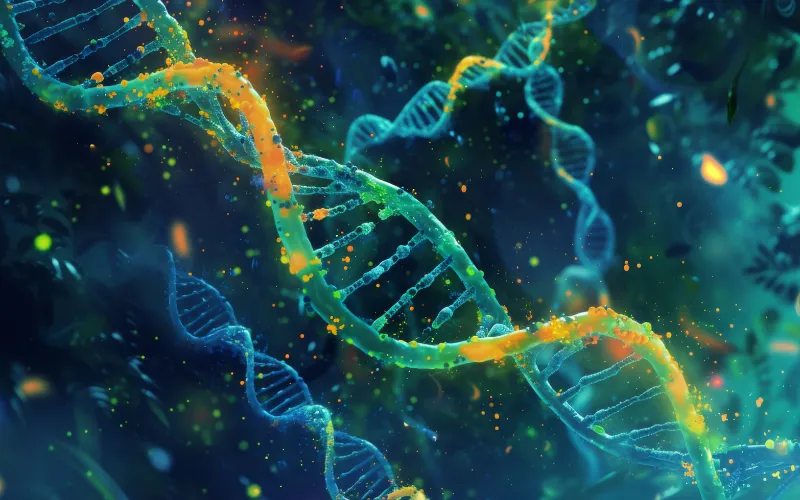
For decades, weight management protocols have relied on population averages: prescribing calorie targets, macronutrient ratios, or generic “balanced diets” that ignore the biochemical individuality of the patient, including key hormonal balance factors like insulin sensitivity and cortisol regulation. This results in inconsistent outcomes, high relapse rates, and frustrated clients. Nutrigenomics in weight management changes this equation by using genomic data to predict dietary response at the individual level.
Specific polymorphisms in genes such as FTO, PPARG, ADRB2, and APOA2 can alter appetite regulation, lipid oxidation, thermogenesis, and carbohydrate tolerance. When practitioners integrate these insights with phenotypic data and metabolic biomarkers, they can identify why one patient loses weight rapidly on a low-carb diet while another gains, or why certain individuals respond poorly to high-intensity exercise without specific nutritional adjustments.
This isn’t just a theory; peer-reviewed evidence now supports genotype-guided interventions that can improve weight loss efficiency, maintain lean mass, and reduce metabolic risk. This guide distills the science into a clinical playbook, enabling you to design precision nutrition strategies that are both scientifically grounded and operationally feasible in practice.
Key Takeaways
-
Nutrigenomics is revolutionizing weight management by focusing on the interaction between genetics and nutrition, offering personalized dietary strategies instead of one-size-fits-all solutions.
-
Key genetic markers, like FTO, APOA2, and PPARG, significantly influence appetite, fat storage, and metabolism, making it essential to tailor diets to individual genetic predispositions.
-
Epigenetics demonstrates that lifestyle and dietary choices can actively modify gene expression, empowering individuals to overcome genetic predispositions through informed habits.
-
Nutrigenomics-driven strategies, such as optimizing macronutrient distribution and incorporating specific micronutrients like omega-3s and polyphenols, enhance metabolic health and weight outcomes.
-
Integrating nutrigenomics into practice requires professional guidance, credible genetic data, and consideration of patient-specific factors, such as cultural preferences and lifestyle constraints.
-
While promising, nutrigenomics is still evolving; it works best alongside consistent behavioral changes, such as mindful eating, exercise, and sustainable dietary practices.
Table of Contents
Understanding Nutrigenomics in the Context of Weight Management
Nutrigenomics is a growing field that’s reshaping how we think about weight management. The goal is to understand how your genetic code influences how you process food, store fat, and feel full—or still hungry after a big meal. Instead of one-size-fits-all dieting, it’s about giving you a personalized map to navigate your weight journey.
The Role of Genetics in Body Composition
Genes aren’t just the blueprint for your eye color or height—they’re also instructions about your metabolism, appetite, and even your body composition. Some gene stars in this show include UCP1 and ADRB3, which influence how much energy you burn at rest. Imagine them as your body’s ‘energy thermostats’, deciding whether to sweat out calories effortlessly or cling to every ounce—not ideal for that holiday weight gain.
Then there’s MC4R, often called the “hunger gene”. Variants of this gene could mean your brain doesn’t get the memo to stop eating. And let’s not forget FTO, known for its link to fat storage and metabolism. People with certain variations of this gene might find it harder to lose weight, even with mindful efforts.
These genes and their buddies influence how your body breaks down lipids (fats) and carbohydrates, meaning that what works for someone else—a high-carb meal plan, for example—might sabotage your progress. Nutrigenomics in weight management peeks into these bio-instructions to craft dietary strategies that work with your body, not against it.
Epigenetics and Environmental Interactions
Genetics isn’t destiny. Enter epigenetics—the way your lifestyle and environment can turn specific genes on or off. For example, the foods you eat act as messengers, influencing the expression of genes related to fat storage and obesity. Think of your diet as writing edits in pen over your genetic manuscript.
Studies show that consistent healthy dietary patterns, like a balanced intake of whole grains and leafy greens, can impact these genetic “edits.“ On the flip side, indulging too often in sugary, processed foods may light up pathways that promote adiposity (aka fat gain). But these changes aren’t permanent. With informed shifts in your diet, you can reverse some epigenetic modifications.
This ability to reset brings hope to obesity prevention. By combining insights from nutrigenomics with an epigenetic awareness, healthcare providers and practitioners like you can create tailored strategies to help patients fight weight challenges in ways that go deeper than calorie counting.

Nutrigenomics in Weight Management:
Key Genetic Markers
In the clinical applications for nutrigenomics in weight management, understanding key genetic polymorphisms is essential for developing targeted nutritional and lifestyle interventions. Several well-characterised genes influence appetite regulation, adipogenesis, lipid metabolism, and thermogenic capacity. Identifying these variants through genomic profiling allows practitioners to move from population-based diet recommendations to precision-based protocols.
FTO: Fat Mass and Obesity-Associated Gene
The FTO gene is one of the most consistently replicated genetic determinants of obesity risk. Specific single-nucleotide polymorphisms (SNPs), such as rs9939609, are associated with increased appetite, higher energy intake, and elevated BMI. Individuals with risk alleles may demonstrate heightened responsiveness to energy-dense, high-glycaemic diets.
Clinical approach: Evidence supports moderating total energy intake and increasing dietary protein to improve satiety and mitigate hyperphagic tendencies in FTO risk carriers.
PPARG: Peroxisome Proliferator-Activated Receptor Gamma
PPARG plays a pivotal role in adipocyte differentiation, lipid storage, and insulin sensitivity. Variants such as Pro12Ala (rs1801282) can influence the propensity for adipose tissue accumulation and metabolic flexibility.
Clinical approach: Diets enriched with monounsaturated fatty acids (e.g., from olive oil, avocado, almonds) and moderated carbohydrate intake have been associated with improved metabolic parameters in individuals with risk variants.
APOA2: Apolipoprotein A-II
The APOA2 gene modulates lipid metabolism and satiety signalling. The rs5082 variant is linked to increased BMI and waist circumference in individuals consuming high levels of saturated fat (>22 g/day).
Clinical approach: Restricting dietary saturated fatty acids while emphasising unsaturated fat sources can attenuate the obesogenic effect of this genotype.
ADRB2 and ADRB3: Beta-Adrenergic Receptors
These genes encode receptors involved in catecholamine-stimulated lipolysis and thermogenesis. Variants such as ADRB2 Gln27Glu and ADRB3 Trp64Arg can reduce lipolytic activity and impair energy expenditure.
Clinical approach: Structured high-intensity interval training (HIIT) and resistance training protocols may help counter reduced thermogenic efficiency, in conjunction with nutritional strategies that support lean mass preservation.

Nutrigenomics-Driven Dietary Strategies for Practitioners
Personalized nutrition for nutrigenomics means tapping into someone’s unique biological script. Consider nutrigenomics as a customized map to help guide dietary strategies based on genetic predispositions. Let’s break down two key areas practitioners like you can focus on: macronutrients and micronutrients.
Personalized Macronutrient Distribution
Did you know that some genetic variants can dramatically alter how macronutrients function?
-
High-Protein Diets for FTO Carriers
If your client has the FTO gene, which affects appetite control and fat storage, a protein-packed diet can be the answer. Foods like lean chicken, Greek yogurt, or even plant-based proteins like lentils keep hunger hormones in check and cravings at bay.
-
Low-Carb Approaches for Insulin Resistance-Related SNPs
For individuals battling insulin resistance due to specific SNPs, carbs can both be a friend and an enemy, tempting but sometimes harmful. A controlled low-carb plan can work wonders here, shifting the focus to non-starchy veggies, healthy fats like avocados, and moderate protein. It’s about creating balance, not deprivation.
-
Fat Quality Over Quantity for APOA2 and PPARG Variants
Not all fats are equal—some are team players, while others stir trouble. If someone carries the APOA2 variant, they’re more sensitive to saturated fats (such as greasy burgers and buttery treats). PPARG, on the other hand, thrives when you optimize fat sources. Swap out butter for olive oil, sprinkle some nuts into salads, and think “quality over quantity” when loading up on fats.
Micronutrient and Phytochemical Interventions
Small but mighty—micronutrients and phytochemicals can shape how genes express themselves (or don’t). Here’s how to fine-tune your client’s nutrient intake for significant results.
-
Omega-3 Responsiveness Based on FADS1/FADS2
Not everyone processes omega-3s the same way—blame it on genes like FADS1 and FADS2. People with specific variants might need to be more intentional about omega-3s, focusing on fatty fish like salmon or adding algal oil supplements. They’ll fuel their body and give their anti-inflammatory pathways a boost.
-
Polyphenols for Antioxidant Gene Expression
Polyphenols, the compounds in berries, green tea, and dark chocolate, help curb oxidative stress. These compounds assist in fine-tuning gene expression, clearing free radicals, and giving metabolic health a boost.
-
Vitamin D and the VDR Gene
Vitamin D can feel like sunshine in a bottle, but if someone has VDR gene variations, their body might not use it as efficiently. For these individuals, ensuring ample sunlight, fortified foods, or even the right supplements can combat adiposity and metabolic slowdowns.
By leveraging these strategies, you can move beyond one-size-fits-all diets and offer solutions tailored to your clients’ genetic “blueprints.” It’s science giving us so much-needed clarity—finally answering why that diet worked for your friend but sent your metabolism into a tailspin.

Misinterpretations That Undermine Clinical Outcomes
1. Thinking genetics alone determines weight.
Sure, genes play a role, but thinking “my genes are in charge“ is like blaming the driver when the road’s full of potholes. Environmental factors, like diet and exercise, still influence how those genes express themselves. Nutrigenomics weight management doesn’t mean giving up on basic healthy habits; it layers precision onto those rules. Your lifestyle is the co-author of your health story.
2. Expecting instant results from a genetically-based diet.
Nutrigenomics isn’t a steady process, and it takes time to see results. By personalizing your nutrition based on genetic insights, you’re setting the stage for long-term success—but it won’t replace effort overnight. Be patient; it’s like planting a garden. The groundwork takes time, but the eventual reward is healthier habits and better weight outcomes.
3. Oversimplifying complex gene–diet interactions.
Weight gain or loss isn’t just about the foods you eat, but also about how your body processes them on a molecular level. For instance, the FTO gene might predispose you to stronger hunger signals, but loading up on protein can help curb cravings. Without tailored guidance, focusing only on general advice could leave you frustrated.
4. Believing nutrigenomics eliminates the need for behavioral changes.
You can’t hack your way out of lifestyle habits. Nutrigenomics might tell you certain fats fit your genes better, or carbs aren’t your enemies, but you’ll still need consistency—meal planning, sleep, movement—to see results.
5. Applying preliminary research without clinical validation.
This science is promising but still evolving. So, if you’re trying to use every genetic tidbit in your work, you might feel like you’re assembling a puzzle missing pieces. Focus on well-studied genes with clear connections to diet and weight, such as FTO, APOA2, or PPARG, instead of overreaching into unclear territories. An overly ambitious approach without sufficient research backing can lead to unnecessary confusion or even missteps.
Practitioner Resources and Tools
In nutrigenomics for weight management, the right resources can turn complex genetic information into clear, actionable strategies for your patients. Think of this as your precision nutrition toolkit — a combination of evidence, technology, and communication aids to deliver personalized care that works.
Peer-Reviewed Databases for Reliable Evidence
Accurate recommendations start with credible data. Databases like the GWAS Catalog allow you to explore research linking specific gene variants to traits such as appetite regulation, metabolism, or fat storage. This means you can directly target dietary interventions based on genetics, rather than relying on one-size-fits-all nutrition advice.
Decision-Support Software to Streamline Interpretation
Genetic reports can be dense and time-consuming to interpret. Decision-support platforms — such as Opus23 Explorer™ or GenomicInsight™ — process raw genetic data and convert it into clear, practical recommendations. These tools can quickly highlight relevant gene variants (e.g., FTO, UCP1) that may influence weight loss resistance or metabolic efficiency, allowing you to tailor dietary strategies without spending hours on manual analysis.
Bioinformatics Tools for Deeper Analysis
For practitioners who want to go beyond standard reporting, bioinformatics platforms offer a more detailed look at genetic datasets. These tools can identify patterns in genes linked to metabolism, fat storage, inflammation, and nutrient processing. While they require more advanced training, they provide a deeper layer of insight for highly personalized interventions.
Continued Education in Nutrigenomics
The field of nutrigenomics in weight management evolves rapidly, and staying ahead is essential for delivering effective, evidence-based care. The Integrative Genomics Specialist Program from Elite Gene Labs is explicitly designed for practitioners who want to confidently interpret genetic data and apply it in real-world weight-management protocols. Over six months, you’ll gain practical skills in decoding key SNPs, designing personalized nutrition strategies, and integrating genomics into your clinical workflow—backed by ready-to-use resources, live training, and certification to enhance your professional credibility.
Patient-Friendly Communication Tools
Discussing genetic predisposition can be sensitive. Patients may think their genes dictate an unchangeable “weight fate.” Using visual aids like flowcharts, interactive quizzes, and real-world case studies can make the science relatable. Framing it as “genes set the blueprint, but lifestyle builds the structure” can help patients see the control they still have over outcomes.
Collaborative Practitioner Networks
You don’t have to navigate complex nutrigenomics cases alone. Engaging with professional forums, multidisciplinary teams, or specialist groups can give you access to peer input on interpreting tricky SNPs (e.g., ADRB3, MC4R). Sometimes a quick exchange with colleagues can shortcut hours of research.
Integrating Tools into Daily Practice
The real power comes from combining these resources with foundational assessments like dietary history, physical activity patterns, and metabolic biomarker testing. This layered approach allows you to create practical, evidence-based weight management plans that are both personalized and sustainable.
Conclusion: Strategic Implementation of Nutrigenomics in Weight Management
Nutrigenomics in weight management provides a clinically grounded framework for moving beyond population-based diet models toward precision interventions that reflect each patient’s genetic profile. By integrating genomic insights with phenotypic data, biomarker analysis, and evidence-based nutrition strategies, practitioners can design weight management plans that are both targeted and sustainable. This approach aligns nutritional recommendations with the patient’s unique metabolic pathways, improving adherence, clinical outcomes, and long-term health trajectories. In practice, success depends on pairing robust genomic interpretation with practical lifestyle interventions—ensuring that precision care remains actionable, measurable, and results-driven.
Frequently Asked Questions
What is nutrigenomics in weight management?
Nutrigenomics in weight management is the study of how your genes influence your body’s response to food, metabolism, and fat storage. By analyzing specific genetic markers, practitioners can design nutrition and lifestyle plans that align with your genetic profile, making weight management more precise and sustainable.
How do genetics influence weight gain or loss?
Certain genes affect appetite regulation, energy use, and nutrient metabolism. Variants in genes like FTO, PPARG, and ADRB3 can influence how easily you gain or lose weight. Understanding these genes helps tailor nutrition strategies to your biology rather than relying on trial-and-error diets.
How is nutrigenomics different from traditional dieting?
Traditional diets use a one-size-fits-all approach, while nutrigenomics creates personalized plans based on your genetic profile. This method identifies how your body responds to specific foods, macronutrients, and exercise types, improving the likelihood of long-term weight control.
Can lifestyle changes override genetic predisposition to weight gain?
Yes. While your genes influence weight tendencies, diet quality, physical activity, sleep, and stress management can activate or suppress genetic expression, improving weight outcomes despite inherited predispositions.
Are epigenetics and nutrigenomics related?
Yes. Epigenetics studies how lifestyle and environment affect gene activity. Nutrigenomics applies this by identifying which dietary and lifestyle changes can positively influence genes linked to metabolism, appetite, and fat storage.
Do direct-to-consumer DNA diet tests work?
Many consumer DNA diet tests provide limited or oversimplified insights. For accurate, actionable results, work with a trained nutrigenomics practitioner who uses validated testing methods and interprets results in a clinical context.
What is the FTO gene and why is it important for weight management?
The FTO gene influences appetite and satiety signals. Certain variants are linked to increased hunger and higher calorie intake, which can contribute to weight gain. Knowing your FTO status helps practitioners recommend dietary strategies that enhance fullness.
How do practitioners use genetic data to support weight loss?
Practitioners combine genetic test results with health history, lab markers, and lifestyle assessments. This integrated approach enables them to recommend specific dietary ratios, meal timing, and activity types that best suit an individual’s genetic makeup.
Is nutrigenomics appropriate for everyone seeking weight management?
Yes, most individuals can benefit from nutrigenomics-based insights. However, the success of any plan depends on combining genetic knowledge with personalized lifestyle and nutrition changes tailored to each person’s needs.
References:
- American Society for Nutrition. (2016). FTO genotype and weight loss in diet and lifestyle interventions: Meta-analysis [Meta-analysis]. The American Journal of Clinical Nutrition. Retrieved from https://pubmed.ncbi.nlm.nih.gov/26888713/
- Abstract P129: FTO genotype and 2-year change in body composition and fat… (Year unspecified). AHA Journals. Retrieved from https://www.ahajournals.org/doi/10.1161/circ.125.suppl_10.AP129
- Walley, A. J., et al. (2018). FTO genotype, dietary protein intake, and body weight in a population-based sample. Genes & Nutrition. Retrieved from https://doi.org/10.1186/s12263-018-0593-7
- PPARγ Pro12Ala interacts with fat intake for obesity and weight loss in a behavioural treatment based on the Mediterranean diet. ResearchGate. Retrieved on Researchgate
- Corella, D., et al. (2011). APOA2-saturated fat interaction and body mass index and obesity in multiple populations. The American Journal of Clinical Nutrition. Retrieved from https://www.ncbi.nlm.nih.gov/pmc/articles/PMC3030929/
- Corella, D., et al. (2009). APOA2, dietary fat and body mass index: Replication of a gene-diet interaction in multiple populations. JAMA Internal Medicine. Retrieved from https://jamanetwork.com/journals/jamainternalmedicine/fullarticle/1108560
- Adrenergic receptor gene polymorphisms (ADRB2 1053G/C and ADRB3 Trp64Arg) contribute to adolescent obesity variation. Journal of Human Genetics. Retrieved from https://www.nature.com/articles/jhg200556
- The influence of the ADRB2 Gln27Glu and ADRB3 Trp64Arg polymorphisms on weight loss and body composition. Institutional Repository of UPM. Retrieved from https://oa.upm.es/40969/1/INVE_MEM_2015_224713.pdf
(2020). Pro12Ala polymorphism of the PPARγ2 gene does not influence body composition response to aerobic training. Frontiers in Physiology. Retrieved from https://www.frontiersin.org/articles/10.3389/fphys.2020.00385/full
(2016). FTO genotype and weight loss: Systematic review and meta-analysis. BMJ. Retrieved from https://www.bmj.com/content/354/bmj.i4707

